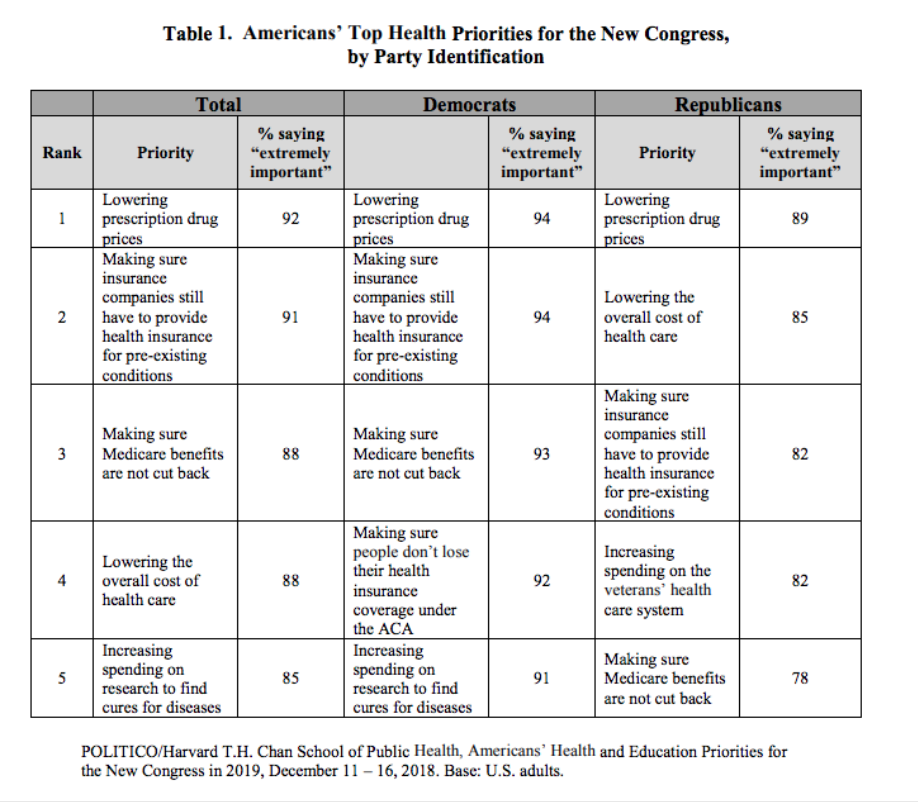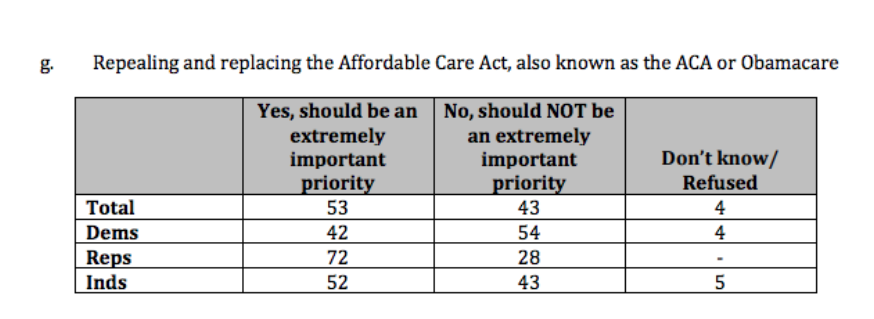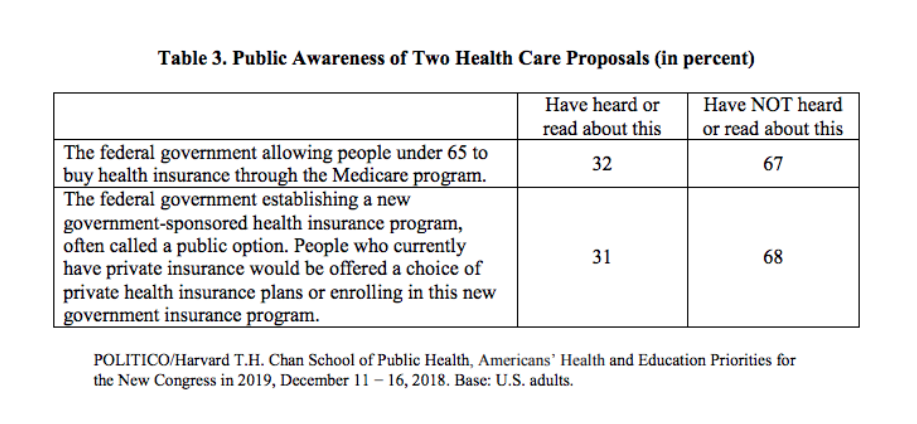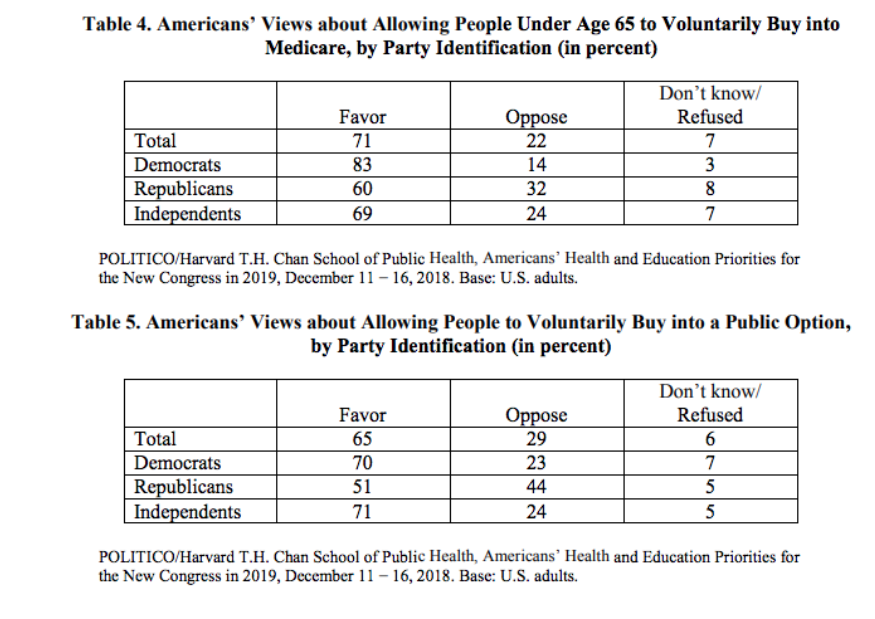In 2018, American voters sent a Democratic majority to the House of Representatives and strengthened the GOP’s current majority in the Senate, which sets the stage for a divided government for the final two years of President Trump’s first term. This comes amid increasing public pressure for Congress to reform the U.S. health care system.
If history offers us any clue as to what we should expect from this new political configuration, we should expect very little in terms of substantive health care legislation passed. Given this, it is still very important to understand exactly what Americans want their health care system to look like. Thanks to polling done by POLITICO and the Harvard School of Public Health, we have some clues.

The chart above breaks down American’s top health priorities overall, including priorities among Republicans and Democrats. This chart details the top issues that survey respondents deemed “extremely important,” which likely translates to issues they would like to see addressed by the new Congress. First, it is clear that “lowering prescription drug prices” is the most important issue across the board. Not only is this the most important issue for the overall survey, but it is also the top issue for both Democrats and Republicans. Ensuring that people with pre-existing conditions can’t be denied coverage by insurers is the second most important issue overall. Ninety-four percent of Democrats felt that this was extremely important compared to 82 percent of Republicans.
Not scaling back benefits for Medicare patients ranked third among all issues as extremely important and also ranked in the top five for each party with 93 percent of Democrats and 78 percent of Republicans saying this issue was very important. Next, “lowering the cost of health care” was ranked the fourth most important overall. However, Republicans ranked this issue as the second most important, while this issue did not rank in the top five for Democrats. Finally, the issue of increasing federal spending for research to find cures to diseases was the fifth most important issue overall. Democrats ranked this as the fifth most important issue with 91 percent of respondents saying that it was very important and Republicans did not rank this issue in their top five most important issues.
The survey also gave us some insight into how Americans feel about specific policy proposals designed to achieve some of the desired outcomes discussed above. Much of the public discussion about health care has centered around either fixing the Affordable Care Act or moving to a universal system, such as the proposed “Medicare-for-all.”
The law of the land is the Affordable Care Act (ACA). How do Americans feel about the ACA or commonly referred to as Obamacare?

The country is split roughly in half on the importance of repealing and replacing the ACA. But close to half of Democrats and almost three-quarters of Republicans believe that this should be a priority. However, if Congress were to repeal and replace the ACA, what would the public want to come next? Two popular proposals are allowing people to buy into Medicare before age 65 or to create a “public option” that would set up a system where government and private insurance companies would each sell insurance to the public. Here is the public awareness of these two proposals:

Two-thirds of respondents hadn’t heard of either proposal. However, here is the chart that shows the respondent’s support for these proposals:

Overwhelmingly, Democrats support both options (Medicare buy-in = 83 percent, public option = 70 percent) and surprisingly, a majority of Republican respondents do as well (Medicare buy-in = 60 percent, public option = 51 percent).
I believe this chart gives us a great deal of information about Americans’ health policy preferences. Americans know and can identify major problems in the health care industry, mainly the costs of drugs, the total cost of care, and the importance of the most at-risk populations needing care. That is something that most can agree on. However, when we start talking about a means to these ends, that is where Americans start to differ. Americans often support broad policy proposals such as “Medicare for all” or a “public option.” But, as is the case with things like protections for pre-existing conditions and Medicaid expansion, when people are asked about tradeoffs, costs, and implementation, support drops significantly.
Lawmakers should aim to reform the health care system to give Americans more choices, at lower costs, that provide high-quality care. The debate about how to exactly do that will likely continue for a long time. However, elected officials also must be honest with the public. They must do their best to explain the policy proposals under consideration, as well as the attached costs and changes they would bring, compared to how people normally receive care.
It’s not unusual for an American citizen to know very little about how our health care system works. That should not be construed as an insult to the intelligence of American citizens. That is the result of over-regulating an industry to the point that its complexity makes it difficult for ordinary citizens, and even some health care providers, to navigate it easily. Many proposals will be sold to the public as the solution for all health care woes. As we move the health care debate forward, let’s be sure to hold our elected officials accountable for providing accurate and complete details about their health care policy proposals and their intended and unintended consequences.


